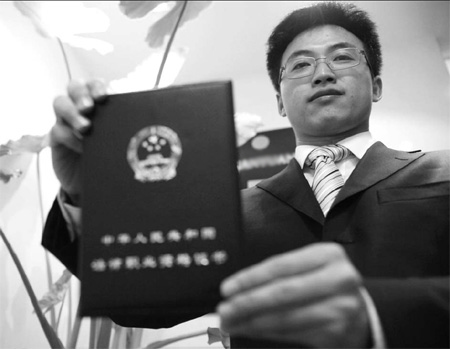Focus
New ruling courts trouble for legal interns
By Wang Chao (China Daily)
Updated: 2010-03-08 10:04
 |
Large Medium Small |
Law-firm hopefuls say association's regulation on residency permit is discriminatory
Beijing hukou holders, or Beijing "locals", have long enjoyed job and educational privileges in the capital.
|
 A lawyer with a Beijing-based law firm, concedes that Beijing has been tightening its policy toward non-local lawyer candidates. |
According to the regulation, released Jan 15, potential law interns must file their personal documents with Beijing talent agencies, which usually require a Beijing hukou, or household registration document. The requirement indirectly drives non-local interns out of Beijing law firms, those left out say.
"I felt my lawyer dream in Beijing shattered," a 30-year-old woman who declined to provide her name told Beijing News.
She studied four years at a law school, got a degree and passed the legal examinations after several attempts. The new regulation was issued just as she was about to head to Beijing for a law internship.
After passing the legal examinations, candidates must undertake a yearlong internship in a law firm to be qualified to practice law. Now hukou status, or more precisely the lack of it, has become a big barrier for many prospective lawyers.
A lawyer surnamed Xie with a Beijing-based law firm, chose to do her internship in her hometown instead of Beijing. She refused to reveal the name of her employer.
"I thought the policy on personal documents was too complicated in Beijing, so I intentionally shunned it by doing it in my hometown," Xie said.
But Xie dared to do that for a reason. She graduated from an overseas university and could get a hukou in Beijing once she got a job under the Ministry of Education policy.
Many graduates of Chinese law schools seek internships in Beijing to boost their resumes and thus increase the chances of staying in Beijing.
According to the Beijing Lawyers Association, more than 21,000 lawyers work in Beijing. Half of them are from outside Beijing. About 2,500 new lawyers come to Beijing every year.
Before the new edict, applicants for Beijing internships needed to submit a personal document storage certificate, which could have been from anywhere.
However, Li Bingru, general secretary of the Beijing Lawyers Association, said the new regulation does not constitute discrimination against non-locals because "it requires a personal document certificate from a Beijing talent agency, not a Beijing hukou."
But the fact remains that without a Beijing hukou, Beijing talent agencies will not accept other personal documents from candidates, according to the Beijing Talent Agency.
Law firms as well as non-local lawyer candidates are seeking a solution to the problem.A lawyer surnamed Yang working in the same law firm with Xie, told METRO that after the new regulation came to effect, his company offered a limited number of Beijing hukou to graduates. Those who didn't get them choose to return to their hometown where their personal documents are kept, and do the internships.
"After they got the lawyers' practice certificate after the one-year-internship, they then try to get reassigned to law firms in Beijing, if they still want to develop a career in this city." Yang said.
According to Yang, although it takes time, that tack might be the easiest way to wind up in Beijing.
It takes dedication to become a lawyer in China. After passing legal examinations, candidates can get a legal professional qualification certificate, which enables them to be a potential prosecutor or private lawyer. Then they need a certificate for an internship with a law firm; after one year, they can get the lawyer's practice certificate, which finally allows them to be a lawyer.
Yang said Beijing has been tightening its policy toward non-local lawyer candidates. Two years ago, a personal document certificate from any province sufficed, but starting two years ago, the Beijing firms began to require a certificate with the national talent agency. One month ago the association began to implement the new regulation, indirectly making a Beijing hukou a prerequisite for a legal internship in the capital.
The hukou system is not only a barrier for those who are seeking an internship in Beijing, but also a pain for many other people.
In Beijing alone, about half of the 460,000 children born in the past three years were not eligible for hukou registration, Hu Xingdou, an economics professor at the Beijing Institute of Technology, said in an interview with the Financial Times.
On March 1, several days before the annual National People's Congress meeting, 13 Chinese newspapers carried an identical front-page editorial urging the abolition of the hukou system.







